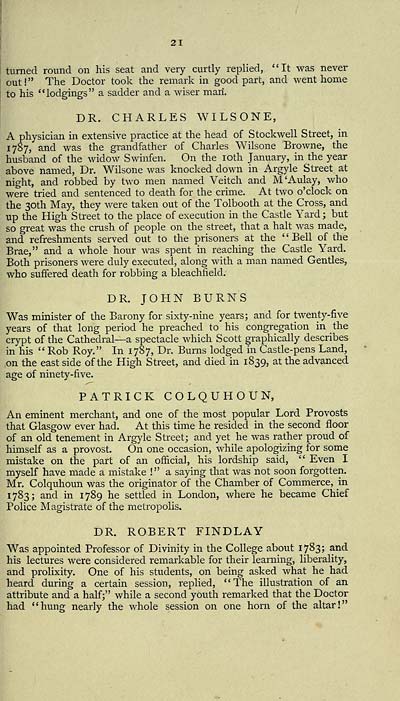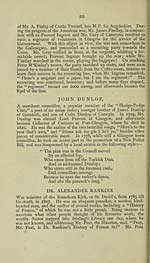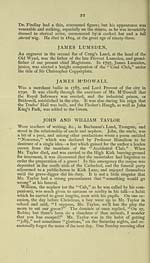Towns > Glasgow > 1787 - Reprint of Jones's directory; or, Useful pocket companion for the year 1787
(29)
Download files
Complete book:
Individual page:
Thumbnail gallery: Grid view | List view

21
turned round on his seat and very curtly replied, "It was never
out ! " The Doctor took the remark in good part, and went home
to his "lodgings" a sadder and a wiser man,
DR. CHARLES WILSONE,
A physician in extensive practice at the head of Stockwell Street, in
1787, and was the grandfather of Charles Wilsone Browne, the
husband of the Avidow Swinfen. On the loth January, in the year
above named. Dr. Wilsone was knocked down in Argyle Street at
night, and robbed by two men named Veitch and M'Aulay, who
were tried and sentenced to death for the crime. At two o'clock on
the 30th May, they were taken out of the Tolbooth at the Cross, and
up the High Street to the place of execution in the Castle Yard ; but
so great was the crush of people on the street, that a halt was made,
and refreshments served out to the prisoners at the ' ' Bell of the
Brae," and a whole hour was spent in reaching the Castle Yard.
Both prisoners were duly executed, along with a man named Gentles,
who suffered death for robbing a bleachfield.
DR. JOHN BURNS
Was minister of the Barony for sixty-nine years; and for twenty-five
years of that long period he preached to his congregation in the
crypt of the Cathedral — a spectacle which Scott graphically describes
in his " Rob Roy." In 1787, Dr. Burns lodged in Castle-pens Land,
on the east side of the High Street, and died in 1839, at the advanced
age of ninety-five.
PATRICK COLQUHOUN,
An eminent merchant, and one of the most popular Lord Provosts
that Glasgow ever had. At this time he resided in the second floor
of an old tenement in Argyle Street; and yet he was rather proud of
himself as a provost. On one occasion, while apologizing for some
mistake on the part of an official, his lordship said, " Even I
myself have made a mistake !" a saying that was not soon forgotten.
Mr. Colquhoun was the originator of the Chamber of Commerce, in
1783; and in 1789 he settled in London, where he became Chief
Police Magistrate of the metropolis.
DR. ROBERT FINDLAY
Was appointed Professor of Divinity in the College about 1783; and
his lectures were considered remarkable for their learning, liberality,
and prolixity. One of his students, on being asked what he had
heard during a certain session, replied, "The illustration of an
attribute and a half;" while a second youth remarked that the Doctor
had "hung nearly the whole session on one horn of the altar!"
turned round on his seat and very curtly replied, "It was never
out ! " The Doctor took the remark in good part, and went home
to his "lodgings" a sadder and a wiser man,
DR. CHARLES WILSONE,
A physician in extensive practice at the head of Stockwell Street, in
1787, and was the grandfather of Charles Wilsone Browne, the
husband of the Avidow Swinfen. On the loth January, in the year
above named. Dr. Wilsone was knocked down in Argyle Street at
night, and robbed by two men named Veitch and M'Aulay, who
were tried and sentenced to death for the crime. At two o'clock on
the 30th May, they were taken out of the Tolbooth at the Cross, and
up the High Street to the place of execution in the Castle Yard ; but
so great was the crush of people on the street, that a halt was made,
and refreshments served out to the prisoners at the ' ' Bell of the
Brae," and a whole hour was spent in reaching the Castle Yard.
Both prisoners were duly executed, along with a man named Gentles,
who suffered death for robbing a bleachfield.
DR. JOHN BURNS
Was minister of the Barony for sixty-nine years; and for twenty-five
years of that long period he preached to his congregation in the
crypt of the Cathedral — a spectacle which Scott graphically describes
in his " Rob Roy." In 1787, Dr. Burns lodged in Castle-pens Land,
on the east side of the High Street, and died in 1839, at the advanced
age of ninety-five.
PATRICK COLQUHOUN,
An eminent merchant, and one of the most popular Lord Provosts
that Glasgow ever had. At this time he resided in the second floor
of an old tenement in Argyle Street; and yet he was rather proud of
himself as a provost. On one occasion, while apologizing for some
mistake on the part of an official, his lordship said, " Even I
myself have made a mistake !" a saying that was not soon forgotten.
Mr. Colquhoun was the originator of the Chamber of Commerce, in
1783; and in 1789 he settled in London, where he became Chief
Police Magistrate of the metropolis.
DR. ROBERT FINDLAY
Was appointed Professor of Divinity in the College about 1783; and
his lectures were considered remarkable for their learning, liberality,
and prolixity. One of his students, on being asked what he had
heard during a certain session, replied, "The illustration of an
attribute and a half;" while a second youth remarked that the Doctor
had "hung nearly the whole session on one horn of the altar!"
Set display mode to: Large image | Transcription
Images and transcriptions on this page, including medium image downloads, may be used under the Creative Commons Attribution 4.0 International Licence unless otherwise stated. ![]()
| Scottish Post Office Directories > Towns > Glasgow > Reprint of Jones's directory; or, Useful pocket companion for the year 1787 > (29) |
|---|
| Permanent URL | https://digital.nls.uk/85272147 |
|---|
| Description | Directories of individual Scottish towns and their suburbs. |
|---|
| Description | Around 700 Scottish directories published annually by the Post Office or private publishers between 1773 and 1911. Most of Scotland covered, with a focus on Edinburgh, Glasgow, Dundee and Aberdeen. Most volumes include a general directory (A-Z by surname), street directory (A-Z by street) and trade directory (A-Z by trade). |
|---|


